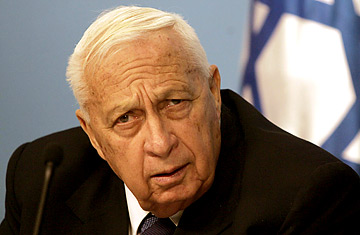
Israeli Prime Minister Ariel Sharon addresses a press conference in Jerusalem in November, 2005.
The comic narrative tends to focus on what would happen if Sharon suddenly woke up: As one columnist had it, the ravenous statesman munches a few of his favorite falafels, then asks a hospital orderly what has happened in Israel while he was asleep. After hearing all the grim news, starting with the fact that his underling Ehud Olmert had snatched his job and blown it, he decides that a coma is better than reality, and drifts back to sleep.
Black humor aside, if Sharon were indeed to recover, he would be in for a string of nasty surprises. The Israeli military went to war in Lebanon but failed to defeat Hizballah, shattering the notion that the Israeli Defense Forces could crush any Arab threat. His son Omri faces jail on corruption charges. Hamas runs the Palestinian government. His beloved Sycamore Ranch in the Negev is within striking distance of Palestinian rockets fired from Gaza. His friend and crony Moshe Katzav, the President of Israel, is under investigation for rape. Sharon would also learn that with Olmert's limp hand at the helm, the fortunes of his Kadima party are fast sinking; a poll last Thursday showed that 77% of Israelis disapprove of Olmert, whom they perceive as weak and shifty. Nor is America as obedient to Israel's demands as it was when Sharon was giving bear hugs at the White House. Sharon could be forgiven for thinking that without his leadership, the Israeli body politic had also lapsed into a coma.
And the final insult for Sharon: American Evangelist Pat Robertson claims (presumably through a reliable source) that Sharon was, in fact, struck down by God as punishment for the Israeli leader's withdrawal of Jewish settlers from Gaza, thereby "dividing" the Holy Land. If anything, according to a new biography written by Uri Dan — an unabashed fan and friend of the stricken Israeli leader — he was continuing his life's work of trying to consolidate Israel's grip on as much of the Holy Land as possible, and he had no intention of giving up West Bank settlements. Dan writes that Sharon told him in September 2005, "Fortune-tellers claim to know that another disengagement is planned. Another lie. The withdrawal from Gaza is an isolated act."
Too bad he never passed that on to Olmert, or to the Israelis. Many Israelis interpreted the withdrawal of Gaza as a baffling metamorphosis, in which Sharon transformed himself from a merciless conqueror of Arabs to a grandfatherly peacenik. His critics claim that Sharon probably pulled out to distract the Israeli press from the corruption charges swirling around him, and to reshape international opinion in order to enhance Israel's prospects for holding onto the more prized Israeli settlements in the West Bank.
Many Israelis miss their strongman, but Sharon, in his coma, has outlived his own legacy. His plan to unilaterally redraw Israel's borders heedless of Palestinian wishes has proven a failure; rockets are still spewing out of Gaza. Because of Sharon, Israel is also less secure on its northern front. Already burned by an 18-year occupation of Lebanon, Sharon would probably have refrained from Olmert's blundering all-out attack last summer. But it was on Sharon's watch that Hizballah built up its defenses and smuggled missiles from Iran and Syria. Sharon might not recognize the country he left behind when he suffered his stroke a year ago, but many Israelis are coming around to the belief that Sharon's decisions have weakened their country's security.
